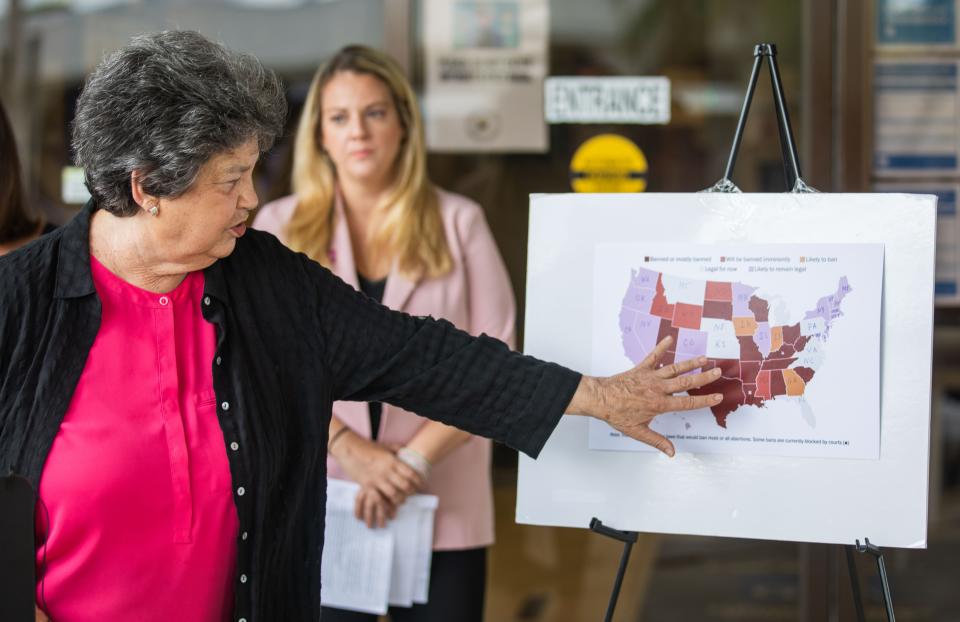Timeline of laws: Florida legalized abortion nearly a year before Roe v. Wade
Since the 1972 legalization of abortion in Florida, and a year later across the United States with Roe v. Wade, a series of laws have directly affected access to critical health services, including terminating a pregnancy for women who are or could be pregnant. Here are some of them.

FLORIDA - Abortion ban overturned a year before Roe
Feb. 14, 1972: Florida Supreme Court voids the state's 103-year-old abortion ban.
NATIONAL
Jan. 22, 1973: U.S. Supreme Court rules in Roe v. Wade that the Constitution ensures a woman’s right to have an abortion.
NATIONAL
April 7, 1986: Former President Ronald Reagan signs a bill that contains the federal Emergency Medical Treatment and Labor Act requiring all hospitals with Medicare provider agreements to “stabilize” patients in their emergency rooms if a medical condition or active labor is identified, regardless of ability to pay.
More deaths for women: ‘There’s a lot of fear.’ 2 abortion laws could spell more deaths, especially for Black women
False information from state: A woman seeking an abortion in Florida gets a pamphlet containing false information
5 things to know: Post-Roe, how Florida abortion laws (24-hour delay and 15-week abortion ban) affect emergency care
FLORIDA
July 1, 1997: The Florida “Right to Know Act” requires providers to give women seeking abortions counseling and a pamphlet describing the procedure and its possible risks, the age of their fetus, a description of the fetus and a list of agencies that offer assistance to women who carry their pregnancies to term.
The Presidential Women’s Center in West Palm Beach sues to keep the law from going into effect.
FLORIDA - The battle over the 'Right to Know' law
July 3, 1997: Palm Beach County Circuit Court Judge Kathleen Kroll blocks the “Right to Know” law.
April 6, 2006: The Florida Supreme Court finds the “Right to Know” Act constitutional. Facilities providing abortions now are required to show women seeking the procedure a pamphlet showing drawings and descriptions of phases of fetal development. The pamphlet also lists "Alternatives to Termination" with information about Florida's Pregnancy Support Services program, funded by the state "solely to promote and encourage childbirth," topping the list that also includes Florida's adoption program, Medicaid and maternal and infant health programs.
June 10, 2015: Gov. Rick Scott signs a bill requiring women to make an additional visit to a facility providing them abortion counseling at least 24 hours before the scheduled procedure. The legislature had rejected amendments to the bill that would have:
Imposed a similar mandatory delay and additional trip requirement for a man seeking a vasectomy.
Allowed informed consent to be given electronically instead of in person and allowing women living 100 miles or more from the nearest abortion provider to waive the delay and additional trip requirements.
Created exemptions from the additional trip and delay requirements in cases where the pregnancy poses a threat to women’s health or in cases of fetal anomaly.
.June 11, 2015: The Gainesville Woman Care clinic and the group Medical Students for Choice sue in Leon County Circuit Court to block the law, noting that it will be especially harmful to the most vulnerable women.
The court issues an injunction and the 24-hour-delay is not enforced for the next seven years while it is appealed.
FLORIDA - Parental consent law signed in 2020
June 30, 2020: Gov. Ron DeSantis signs the parental consent law requiring people under 18 seeking abortions to get notarized approval from a parent or guardian or seek a hearing and gain a judge’s consent before terminating a pregnancy.
FLORIDA - This year, 15-week abortion ban, 24-hour rule enacted
April 8, 2022: A Leon County Circuit Court judge upholds the 24-hour delay law, which then goes into effect.
April 15, 2022: DeSantis signs the 15-week abortion ban that mirrors the Mississippi ban under consideration by the U.S. Supreme Court in Dobbs v. Jackson Women’s Health.
April 2022: The Florida Agency for Health Care Administration begins auditing records of clinics providing abortions for compliance with the 24-delay law, leading to complaints against three clinics to date.
In June, U.S. Supreme Court overturns Roe
June 24, 2022: The U.S. Supreme Court issues its decision in Dobbs v. Jackson, overturning Roe v. Wade’s establishment of a constitutional right to legal abortion, saying the decision of whether women can terminate pregnancies should be left to states.
FLORIDA
July 1, 2022: Florida's 15-week ban goes into effect.
NATIONAL
July 11, 2022: The Centers for Medicare & Medicaid Services issues a letter that the right to receive stabilizing emergency medical treatment under the federal Emergency Medical Treatment And Labor Act overrides state abortion bans.
Aug. 25, 2022: A federal judge in Texas finds state law overrides the Emergency Medical Treatment Act. The Centers for Medicare & Medicaid Services amends its July 11 memo to say that the Department of Health and Human Services cannot enforce the federal law requiring emergency care in Texas when it conflicts with the state's abortion ban.
Antigone Barton is a journalist at The Palm Beach Post, part of the USA TODAY Florida Network. You can reach her at avbarton@gannett.com. Help support our journalism. Subscribe today.
This article originally appeared on Palm Beach Post: Florida abortion laws: 15-week ban, 24-hour delay and informed consent

